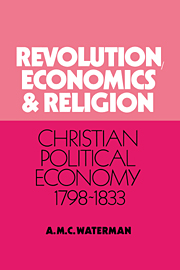Book contents
- Frontmatter
- Contents
- List of figures
- Acknowledgements
- Abbreviations
- 1 POLEMIC, IDEOLOGY AND ‘CHRISTIAN POLITICAL ECONOMY’
- 2 THE FIRST ESSAY ON POPULATION: POLITICAL ECONOMY
- 3 THE FIRST ESSAY ON POPULATION: THEOLOGY
- 4 THE RECONSTRUCTION OF MALTHUSIAN THEODICY: PALEY AND SUMNER
- 5 OXFORD CONTRIBUTIONS: COPLESTON AND WHATELY
- 6 CHALMERS AND THE ESTABLISHMENT
- 7 THE END OF CHRISTIAN POLITICAL ECONOMY
- Appendices: The Malthus–Chalmers model of stationary equilibrium
- Bibliography
- Index
2 - THE FIRST ESSAY ON POPULATION: POLITICAL ECONOMY
Published online by Cambridge University Press: 27 August 2009
- Frontmatter
- Contents
- List of figures
- Acknowledgements
- Abbreviations
- 1 POLEMIC, IDEOLOGY AND ‘CHRISTIAN POLITICAL ECONOMY’
- 2 THE FIRST ESSAY ON POPULATION: POLITICAL ECONOMY
- 3 THE FIRST ESSAY ON POPULATION: THEOLOGY
- 4 THE RECONSTRUCTION OF MALTHUSIAN THEODICY: PALEY AND SUMNER
- 5 OXFORD CONTRIBUTIONS: COPLESTON AND WHATELY
- 6 CHALMERS AND THE ESTABLISHMENT
- 7 THE END OF CHRISTIAN POLITICAL ECONOMY
- Appendices: The Malthus–Chalmers model of stationary equilibrium
- Bibliography
- Index
Summary
POLEMICAL PURPOSE OF THE FIRST ESSAY
Any book called An Essay on the Principle of Population, as it Affects the Future Improvement of Society, with Remarks on the Speculations of Mr Godwin, M. Condorcet, and other Writers was bound to be polemical: especially if published in 1798. Its anonymous author ‘whom we understand to be a Mr Malthas’ [sic] (BC 1801, 279) claimed to have discovered ‘the strongest obstacle in the way to any very great future improvement of society’ (Malthus 1798, iii). Though the Essay owed its origin to a discussion of William Godwin's lately published Enquirer (1797), its chief target was his revolutionary Political Justice (1793, 1796, 1798), especially the putative ‘Benefits Attendant on a System of Equality’ which form the centre-piece of Book VIII (‘Of Property’) of Godwin's great work.
The system of equality which Mr Godwin proposes, is, without doubt, by far the most beautiful and engaging of any that has yet appeared… it is impossible to contemplate the whole of this fair structure, without emotions of delight and admiration, accompanied with ardent longing for the period of its accomplishment. But alas! that moment can never arrive. (1798, 174–5)
The ‘true and genuine situation of man on earth’ is created by ‘the grinding law of necessity’ and for most people, in most times and places, is characterized by ‘misery and vice’. Godwin is mistaken in ‘attributing almost all the vices and miseries that are seen in civil society to human institutions’ (196).
- Type
- Chapter
- Information
- Revolution, Economics and ReligionChristian Political Economy, 1798–1833, pp. 15 - 57Publisher: Cambridge University PressPrint publication year: 1991

